Judge orders Google, Motorola to hand over Android data to Apple
The companies must turn over information about the development of Android, as well as information on their merger.

Apple will soon have far more information about Android and Google's Motorola Mobility acquisition than the search giant would like.
U.S. Circuit Court Judge Richard A. Posner yesterday ordered Motorola Mobility and its soon-to-be parent company Google to hand over development information about Android to Apple, according to Bloomberg, which obtained court documents. In addition, the judge said that Google must provide Apple with information about the company's $12.5 billion deal to acquire Motorola Mobility.
Apple has been asking for the data for quite some time in its battle against Motorola Mobility, which sells smartphones that use the Android OS.
And as one might expect, Google and Motorola Mobility have attempted to stop the sharing of any information with the iPhone maker. However, according to Bloomberg, the judge believed it was a key component in the "discovery" phase of the trial.
Apple and Motorola are locked in a bitter patent dispute in Posner's court over several patents. The first jury trial, which will examine whether Motorola violated six Apple patents, will commence on June 11. After that's completed, Posner will hold a second trial over whether Apple violates three Motorola patents.
That Google has found its way into the trial is notable. After announcing plans to acquire Motorola Mobility last year, Google made it clear that it wanted the mobile company's patents. What it might not have expected, however, was the possibility of getting tossed into existing cases by virtue of that acquisition. Motorola has argued in this case that Google should not be a party to the lawsuit because the mobile firm has no "possession, custody, or control" over Google.
Looking ahead, there's no telling what either Apple or Motorola is hoping to achieve with their lawsuits. In earlier rulings, neither side has been able to win a decisive victory, and in most cases, simple workarounds ensure products stay on store shelves. The chances of that changing this time around seem slim right now.
Apple, Google, and Motorola did not immediately respond to CNET's request for comment.

